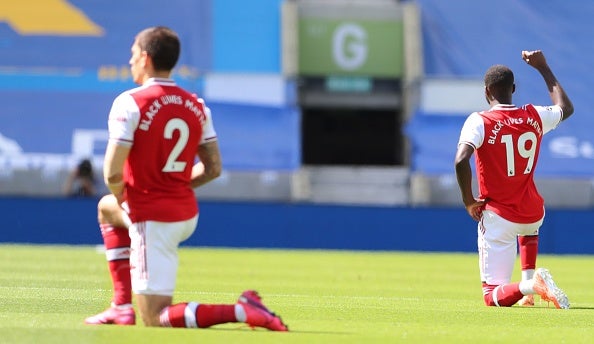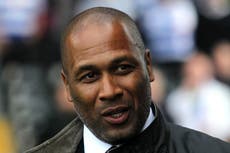Taking the knee before games is at risk of being a mere match day routine
Thanks for the gestures of solidarity, but let’s move past the lip service to Black Lives Matter and anti-racism, and put these ideas into practice in football


Football has resumed post-lockdown, and players in England’s professional leagues have shown their support for the Black Lives Matter movement and anti-racism activism by taking the knee before games. However, debates have emerged in the last few weeks about whether or not this should continue.
Earlier this month, Queens Park Rangers and Coventry City players opted not to take the knee in a recent match. In response, Les Ferdinand, the director of football at QPR, said that “taking the knee was very powerful but we feel that the impact has now been diluted”. He added that “it had run its natural course”.
I don’t agree with the players’ decision to opt out. But I do think we’re overdue a discussion about how this gesture of solidarity can be misused. Taking the knee should symbolise resilience in the face of oppression, amplifying the very real problem of systemic racism and oppression of black people. As things stand, it risks becoming a routine match day procedure, entirely divorced from the fight against racism.
The inaction, complacency and lack of urgency that the Premier League, EFL and English football’s leading authorities have exhibited in tackling the racism in football means taking the knee is becoming a mere gesture and a symbol of continued complacency and inaction. What is being done to address the absence of black people from football boardrooms, FA committees and other key decision-making bodies?
Meanwhile, not enough is being done to support black players who are victims of racist abuse. Birmingham’s Jonathan Leko was racially abused by Leeds United goalkeeper Kiko Casilla during a match last September. Leko claimed there was a lack of support from the Professional Footballers’ Association and leading anti-racist organisations like Kick It Out and Show Racism the Red Card.
The lack of black coaches in English football is also an ongoing problem. Of nearly a hundred first-team coaches in the Premier League and EFL only a handful are from an ethnic minority background.
Promisingly, the Rooney Rule obliges EFL clubs to interview an ethnic minority candidate for all managerial or first-team coaching roles – on the basis that an application is received. However, its success has been limited, as the policy is inherently flawed.
Firstly, appointments for vacant coaching or managerial posts can be made without a formal interview process. Clubs are also not obliged to be transparent over who they interview. Finally, the rule relies on black candidates putting themselves forward – many potential applicants avoid the process over fears that they will be overlooked. Former England international Emile Heskey noted last year that he would not be completing his coaching badges as he feels he would inevitably be disregarded for a coaching position because of his race, regardless of his qualifications. More needs to be done to create a culture that encourages the active participation of black coaches.
Moreover, the Premier League has weakened its stance against anti-black racism with its recent decision to replace the Black Lives Matter logo on the sleeves of footballers’ shirts with “No Room for Racism” – a vacuous slogan which doesn’t have the same impact or resonance.
Though it may not have been the explicit intention, replacing the logo suggests the Premier League is not entirely comfortable with the Black Lives Matter message, vindicating those who have argued the cause is divisive. It is true that there is no room for racism in society, but this summer has brought to the fore the subjugation of black people – it deserves to be highlighted and addressed.
This points to a wider problem. Is there a real desire for change? Or are some governments, organisations and businesses more concerned with optics and good PR?
Lip service is paid to anti-black racism and the need for change but very little of this is seen in practice. It suits the Premier League and EFL that players are taking the knee as it helps to create an illusion and signal of a broader proactive approach to anti-racism. Taking the knee is just window dressing if it is not supported by real action aimed at stamping out racism at all levels of the game.
Unlike other well-paid professions in Britain, black men are well represented among the playing staff in English football. Many of them have used their platforms to voice their concerns about racism. Footballers across the country have shown their commitment to anti-racism but it is now time for the Premier League and EFL to take the radical action required to foster the change required.
Racism, of course, is a societal issue. Many of the issues that exist in football are reflective of the current toxic political climate fuelled by an increasingly authoritarian regime. Boris Johnson’s government has shown a lack of earnestness in tackling racism, sitting on hundreds of recommendations in several reports, and inquiries on racial inequality.
Football is the heartbeat of cities and towns across the country and plays a significant role both culturally and socially. A proactive approach to anti-black racism in football could have wider consequences as to how racism is approached in other areas of British life. As Les Ferdinand aptly noted: actions, not symbols, create real change.
Michael Bankole is a doctoral researcher and host of the podcast ‘Politics JaM’. His doctoral research focuses on race, racism, and political representation
Join our commenting forum
Join thought-provoking conversations, follow other Independent readers and see their replies
Comments



Bookmark popover
Removed from bookmarks